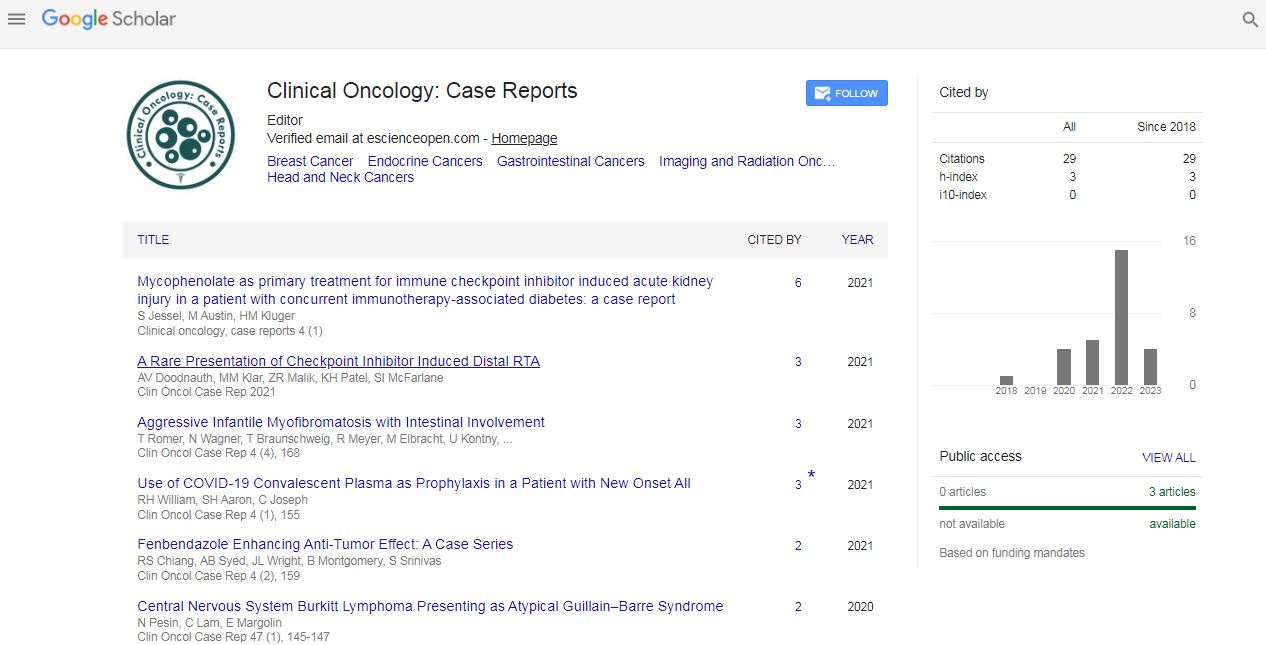Opinion Article, Clin Oncol Case Rep Vol: 10 Issue: 6
Chemotherapy for Breast Cancer
Alina Smith*
Editorial Office,Clinical Oncology Case Report, United Kingdom
*Corresponding Author: Elena Johnson, Editorial Office
Clinical Oncology Case Report, United Kingdom
E-mail: oncologyreport@escienceopen.com
Received:October 14, 2023; Manuscript No: COCR-24-123375;
Editor Assigned: October 17, 2023; PreQC Id:COCR-24-123375(PQ);
Reviewed: October 23, 2023; QC No: COCR-24-123375 (Q);
Revised: October 27, 2023; Manuscript No: COCR-24-123375(R) ;
Published: October 29, 2023; DOI: 10.4172/cocr.6(10).318
Abstract
The treatment of breast cancer often involves chemotherapy as a crucial approach employed by healthcare professionals. In cases where breast cancer surgery is scheduled, chemotherapy may be administered both before and after the surgical procedure. It's common to undergo a combination of different chemotherapy drugs, each with its own set of potential side effects. Your oncologist will guide you in effectively managing these side effects.
Keywords: Breast cancer; Chemotherapy; Progression
Introduction
Chemotherapy, commonly referred to as chemo, employs medications to inhibit or decelerate the proliferation of breast cancer cells. It is categorized as systemic therapy because it circulates through the bloodstream, impacting the entire body.
The distinctive feature of breast cancer cells, characterized by their rapid growth and division, makes them more susceptible to the effects of chemotherapy. Although the primary target is cancer cells, the potent nature of chemotherapy drugs can also harm healthy cells, particularly those with a high rate of growth and division.
Chemotherapy medications are administered through intravenous means, directly entering the bloodstream via an IV, port, or catheter. Alternatively, they can be taken orally in the form of pills or capsule.
Mechanism of Chemotherapy
Chemotherapy medications exert their effects by impeding or halting the growth of breast cancer cells, either by destroying them or preventing their division.
Typically, breast cancer cells exhibit rapid and uncontrolled growth, lacking the order seen in normal cells. Due to their swift proliferation, these cancer cells detach from the original tumor and disseminate to other parts of the body. As chemotherapy circulates through the bloodstream, it targets both the cancer cells in the primary tumor and those distributed throughout the body.
While most healthy cells follow a precise and orderly growth pattern, rendering them less susceptible to the immediate impact of chemotherapy, certain healthy cells divide rapidly. These include cells in the hair follicles, nails, mouth, digestive tract, and bone marrow. Consequently, chemotherapy may affect these quickly dividing cells, resulting in side effects such as hair loss, nail changes, mouth sores, nausea, and vomiting.
Chemotherapy Medications and Treatment Plans
Various chemotherapy medications are employed in the treatment of breast cancer. In instances of early-stage breast cancer, doctors typically advise a combination of two or three medicines based on the cancer's specific characteristics. These combinations, referred to as chemotherapy regimens, include several standardized options applied by doctors in the management of early-stage breast cancer.
For advanced-stage breast cancer, chemotherapy medications are generally administered individually, although doctors may recommend specific combinations in certain situations.
Side effects
Chemotherapy has the potential to adversely affect rapidly dividing cells, including those within your mouth and intest.
Many chemotherapy medications can induce short-term side effects that typically diminish after the completion of chemotherapy. Some of the most prevalent short-term side effects include: Anemia, characterized by low red blood cell counts, Changes in appetite, Constipation, Diarrhea, Fatigue, Fertility issues, Low white blood cell counts, Memory loss, often referred to as "chemo brain", Menopause and associated symptoms, including hot flashes, Mouth and throat sores, Nail changes,Vaginal dryness,Vomiting, Weight fluctuations Some chemotherapy medicines may lead to long-term side effects that necessitate ongoing monitoring. These may include:
• Infertility, as certain chemotherapy medications can affect the ovaries and potentially cease periods and ovulation permanently. Fertility treatments may be required for those seeking to conceive. Chemotherapy can also impact sperm cells, potentially causing permanent infertility
• Bone loss and thinning, with women entering early menopause due to chemotherapy facing an increased risk of osteopenia and osteoporosis.
• Heart damage, particularly associated with anthracycline chemotherapy medicines such as Adriamycin, Doxil, and Ellence. Ongoing heart monitoring may be recommended for individuals who have undergone anthracycline or other heart-affecting chemotherapy.
• Leukemia, in rare instances, may develop as a secondary cancer years after completing breast cancer chemotherapy.
 Spanish
Spanish  Chinese
Chinese  Russian
Russian  German
German  French
French  Japanese
Japanese  Portuguese
Portuguese  Hindi
Hindi 